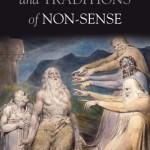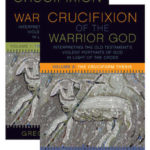We run our website the way we wished the whole internet worked: we provide high quality original content with no ads. We are funded solely by your direct support. Please consider supporting this project.

Does Paul Condone Vindictive Psalms? A Response to Paul Copan (#1)
In a recent paper delivered at the Evangelical Theological Society, Paul Copan raised a number of objections against my book, Crucifixion of the Warrior of God. This is the first of several blogs in which I will respond to this paper. (By the way, Paul and I had a friendly two-session debate on Justin Brierley’s podcast Unbelievable. They will air sometime next month.)
A major thrust of Copan’s critique of my book is his contention that NT authors were not as opposed to violence or to a violent conception of God as I claim. My first couple of posts in this series will address the passages he cites. One of the first examples Copan offers is Paul’s citation of Psalms 69:22-23 in Romans 11:9-10. Here Paul quotes “David” as saying,
Let their table become a snare and a trap,
a stumbling block and a retribution for them;
let their eyes be darkened so that they cannot see,
and keep their backs forever bent.
Copan correctly notes that in CWG I claimed that this vindictive prayer contradicts the life and teaching of Jesus (CWG, 328). To give the full quote, I wrote:
…in direct contradiction to Jesus, who healed the severed ear of an enemy and who spent his entire ministry demonstrating God’s desire for the blind and disabled to be healed, the psalmist petitions God to blind his enemies or to cripple them with scoliosis
The trouble with my view, according to Copan, is that Paul apparently had no problem with this Psalm. He thus concludes I am mistaken in thinking that there is anything about this Psalm that contradicts the life and teachings of Jesus.
To set the stage for my response, I think it’s important to grasp the broader context of the passage that Paul quotes, especially since my statement in CWG was part of a broader critique of this and other imprecatory Psalms. This author not only prays that his personal enemies would be entrapped at their own table, go blind, and be smitten with scoliosis (vv22-23), he also prays that God would pour his “burning anger over them” (v.24). He then prays that the camps of his enemies would become “desolate” so that “no one” would “live in their tents” (v.25). And, most vindictively, he prays that his enemies would receive “no acquittal from you” (v.27) and would be “blotted out of the book of the living” so that none of them would be “enrolled among the righteous” (v.28).
I feel I’m on safe ground when I claim that these prayers contradict the example Jesus left for us to follow when he chose to die out of love for his enemies rather than to use his power to crush them, and when he prayed for the forgiveness of these enemies as he was dying (e.g. Eph 5:1-2; I Pet 2:21; I Jn 3:16). They contradict as well Jesus’ instruction for us to love, bless, and do good to our enemies (Mt 5:39-45; Lk 6:26-35). As such, I see the primary God-inspired revelatory content of vindictive biblical prayers such as these to reside in the manner in which they bear witness to God’s merciful accommodating nature. They reveal that God has always been doing what he does on the cross (Heb 13:8), stooping as far as necessary to meet his people where they are at, and to bear their sin.
But what then do I do with Paul’s quotation of this Psalm? Are we to believe that Paul — who taught us that love is never resentful and hopes for the best for all (I Cor 13:5, 7)– condoned this Psalmist’s prayer for his personal enemies to never be forgiven so their names would be blotted out of the book of life? In my view, the sheer fact that Paul quotes from this Psalm implies nothing of the sort. For as is frequently true of the way Paul and other NT authors cite the OT, the way Paul applies Psalm 69:22-23 dramatically alters its original vindictive meaning.
First, we must notice that, while the original Psalmist was praying against personal enemies whom he hoped would be damned, Paul applies this passage to describe the spiritually stumbling state of Israel as a nation, whom he hopes will be saved (10:1; 11:23). In fact, Paul went so far as to confess that he would be willing to forfeit his own salvation if it would result in the salvation of his Jewish comrades (Rom 9:3). So, while the original passage prescribes vengeance on enemies the author hopes will be damned, Paul uses it in a way that simply describes the tragic spiritual condition of people he loves and hopes will be saved.
Second, while the Psalmist prayed for his enemies to suffer literal physical afflictions, including literal blindness, Paul uses this passage to describe Israel’s spiritual afflictions. And in the context of Romans 9-11, it’s clear that the Israelite “table” that became “a snare and a trap” for them was their assumption that the righteousness of God could be attained by striving for it rather than by relying on faith (e.g. Rom 9:30-32). Hence, while Paul quotes the “letter” of Psalm 60:22-23, he does so with a very different “spirit” (2 Cor 3:6).
I completely agree with Copan that Paul regarded Psalms 69, and the entire OT, to be divinely inspired. Where we seem to disagree is on whether or not this implies that Paul affirmed everything about Psalm 69 and about the OT as a whole. At the very least, Paul’s citation of Psalm 69:22-23 offers no proof that Paul affirmed the expressions of vindictive violence in this prayer, and it thus offers no proof that I was mistaken in claiming these expressions of vindictive violence contradict the life and teachings of Jesus.
Photo by williamnyk on Visual Hunt / CC BY-NC (modified)
Category: General
Tags: Crucifixion of the Warrior God, Cruciform Theology, Paul Copan
Topics: Interpreting Violent Pictures and Troubling Behaviors
Related Reading

The Bible is NOT the Foundation
Many people imagine that the foundation of their faith is the Bible. This is viewed as the ultimate center around which everything they believe revolves. However, the foundation of the Christian faith is actually centered on a person, not a book. Whereas Islam has always presented itself as a “religion of the book,” the kingdom…

How NOT To Be Christ-Centered: A Review of God With Us – Part I
Theologians throughout Church history have used the concept of divine accommodation to account for everything in Scripture that seemed “unworthy” of God. Whatever didn’t line up with what we know about God was seen as God accommodating his revelation to our limited and fallen framework. The trouble is, theologians have, by and large, used the…

The Cruciform Beauty of Horrific Divine Portraits
“Only a person who is aware of the crucified Christ can properly understand Scripture.” Luther (Table Talks) In the last three posts I’ve been wrestling with how insights from Matthew Bate’s book, The Hermeneutics of the Apostolic Proclamation might help us interpret violent portraits of God in the OT in a way that discloses how…

God’s Moral Immutability
Classical theologians from the fourth and fifth centuries on were very concerned with protecting their understanding of the metaphysical attributes of God—like timelessness, immutability, impassibility—by assessing biblical portraits that conflicted with these attributes to be accommodations. However, once we resolve that all our thinking about God must be anchored in the cross, our primary concern…

God of Sense and Traditions of Non-Sense
As the title suggests, in his book, God’s Problem: How The Bible Fails to Answer Our Most Important Question – Why We Suffer, Bart Ehrman argues that the Bible has nothing compelling to say about the problem of evil. Well, I just put down a beautifully written four-hundred and fifty page book that compellingly argues…

Crucifixion of the Warrior God Update
Did you know that authors generally don’t have much say-so about the cover art for their books? It’s considered part of the marketing, so the author may or may not like how it ends up looking. I’ve had a few book covers that made me scratch my head. (I won’t tell you which ones, but it would…
